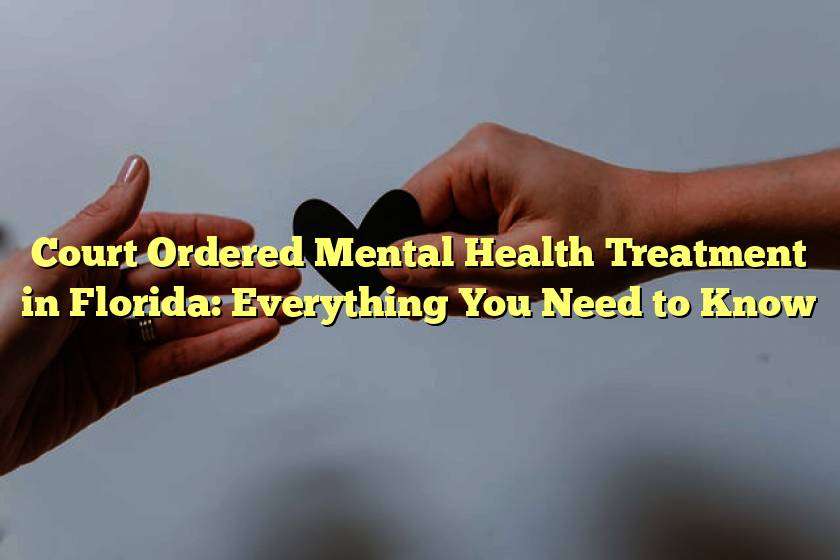Mental health is essential to overall health and well-being. It affects how we think, feel and act, not to mention our relationships with others. For some individuals, mental health conditions can interfere with daily activities and even impair their ability to function normally. When that happens, court-ordered mental health treatment may be necessary. In this article, we will explore everything you need to know about court-ordered mental health treatment in Florida.
What is Court-Ordered Mental Health Treatment?
Court-ordered mental health treatment is a legal process by which a court mandates a person to undergo psychiatric treatment due to their condition. This type of treatment can be ordered during the course of a criminal trial or a family law case, or it can be initiated through a civil commitment. Civil commitment occurs when a person is deemed a danger to themselves or others due to their mental illness and is forced to undergo psychiatric treatment.
Criteria for Court-Ordered Mental Health Treatment in Florida
In Florida, the criteria for court-ordered mental health treatment are governed by the Baker Act, named after Maxine Baker, a Florida state representative who sponsored the bill. The Baker Act allows for the involuntary assessment and treatment of individuals who are experiencing a mental health crisis. The following criteria must be met before a person can be court-ordered for mental health treatment:
-
The person has a mental illness.
-
The person is likely to harm themselves or others.
-
There is no other available means of obtaining treatment voluntarily.
Involuntary Assessment
If a person meets the Baker Act criteria, they may be involuntarily transported to a mental health facility for a psychiatric evaluation. During the evaluation, a mental health professional will assess the person’s mental health status to determine whether they meet the criteria for admission to the facility. If the person is deemed a danger to themselves or others, they may be admitted involuntarily for treatment.
Duration of Treatment
In Florida, the duration of court-ordered mental health treatment is determined by the nature of the individual’s mental illness and the severity of their symptoms. The length of treatment can vary from a few days to several months, and in some cases, even years. Individuals who are court-ordered for mental health treatment are required to complete the full course of treatment as prescribed by their mental health professional.
Consequences of Non-Compliance
Non-compliance with court-ordered mental health treatment can result in severe legal consequences. Individuals who fail to comply with their court-ordered treatment plan may be arrested and charged with a crime. In addition to legal consequences, non-compliance can also lead to a worsening of the individual’s mental health condition and a decline in overall well-being.
Conclusion
Court-ordered mental health treatment is a legal process used to ensure that individuals with mental illness receive the treatment they need to recover and lead productive lives. In Florida, the criteria for court-ordered mental health treatment are governed by the Baker Act, which allows for the involuntary assessment and treatment of individuals who are experiencing a mental health crisis. If you or someone you know is in need of mental health treatment, it is important to seek professional help as soon as possible. The earlier treatment is started, the better the chances for a positive outcome.



